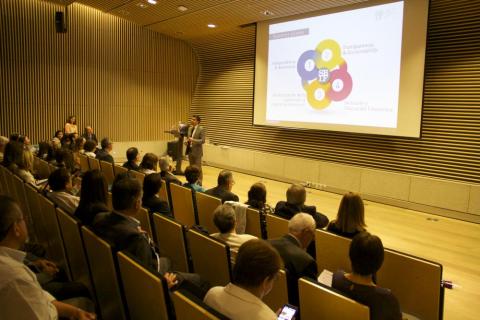
‘When it is difficult to pay a debt, what is more convenient? To renegotiate it or to borrow money to my bank?’ This was one of the audience questions at the event Financial Education for Women from Cooperatives organized by Millennium Institute for Market Imperfections and Public Policies (MIPP), Superintendencia de Bancos e Instituciones Financieras (SBIF), and Federación Chilena de Cooperativas de Ahorro y Crédito (FECRECOOP) on March 16th, 2016.
The event was held in Facultad de Ciencias Físicas y Matemáticas (FCFM) of Universidad de Chile and more than a hundred people from the economic sector of cooperatives attended.
Through the program, the participants learned how to deal with finance by being well informed, and consider their own relationship with money and the importance of financial inclusion to improve life’s quality.
Women are Financially Better Behaved
Financial Education for Women from Cooperatives was held in the context of the International Women’s Day. Among the attendees to the opening ceremony were Patricio Aceituno, Dean of FCFM; Virginia Garretón, Executive Director of ICM; Guillermo Aqueveque, President of FECRECOOP; Patricio Valenzuela, Research Associate of MIPP and Professor of Departamento de Ingeniería Industrial, Universidad de Chile; and Eric Parrado, Superintendent of SBIF, who explained some facts about the financial behavior of women.
Parrado presented a conference about women, the bank system, and small businesses, in which he made a review of the gender situation of Chilean financial organization, underlining women’s good behavior according to payment of bank borrowings: ‘from the total amount of debtors, women are a 13% less than men’, he affirmed.
Cooperative Women of the Year
On the other hand, FECRECOOP celebrated his members, rewarding Aida Moreno with the ‘Woman of the Year’ award. Aida is a renowned social leader who has worked for the rights of domestic workers.
During the second part of the event, Maznah Rajab from Levante Consultores presented about the importance of a ‘healthy’ relationship with money, from a psychological and sociological perspective.
Finally, Patricio Valenzuela, Research Associate of MIPP, explained the importance of the financial inclusion and education, stating that these concepts are fundamental in a micro level because people can benefit, for example, from having savings accounts to handle adversity and in macro level financial inclusion allows countries to develop their economies.
‘Finance is a field of Economics that is centered on the decisions of investment and funding (…) and the value of the information we have is essential when we think about these decisions’, Valenzuela explained and closed the event thanking the audience.
MIPP Chile 2025